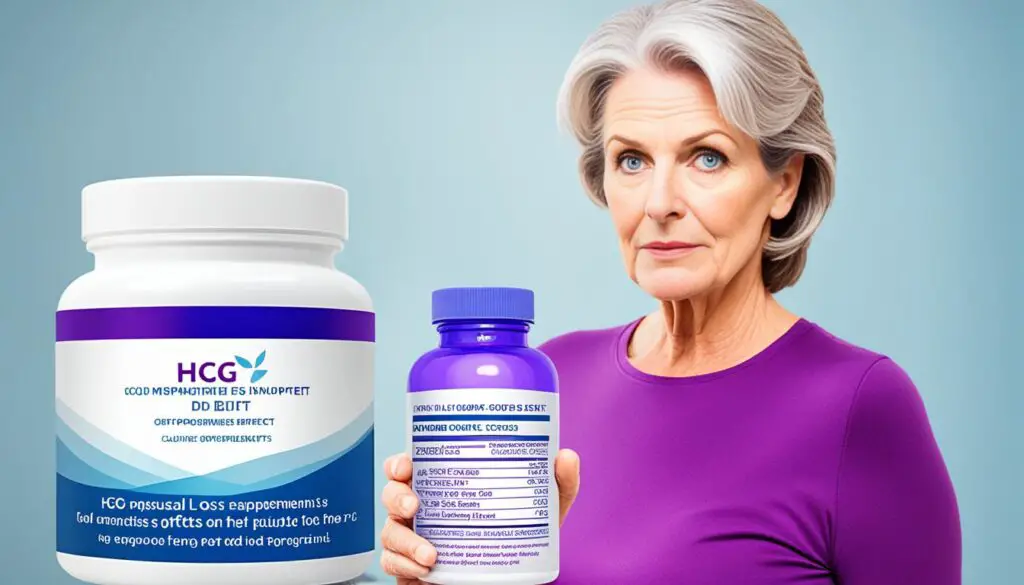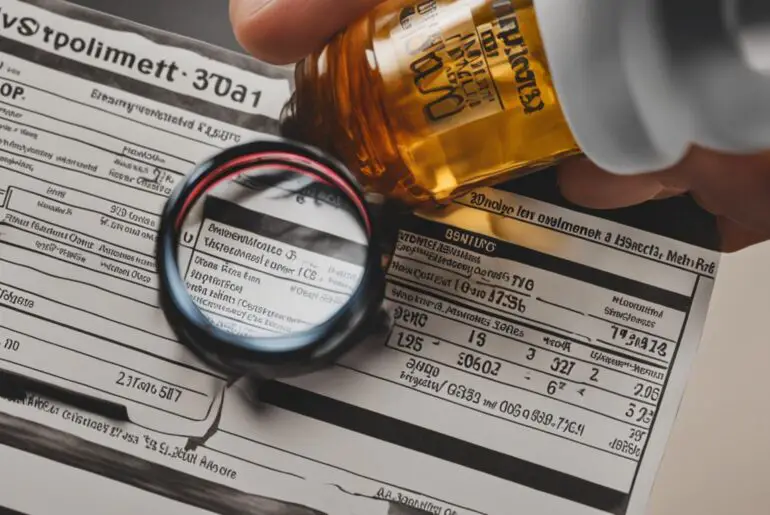Did you know that over 50% of women experience weight gain during menopause? This sudden change in body composition can be frustrating and challenging to manage. Many women turn to various weight loss methods, including the HCG diet, in search of a solution. However, it’s important to understand the potential risks and effectiveness of HCG diet supplements, especially for post-menopausal women.
Post-menopausal women face unique challenges when it comes to weight loss. Hormonal changes, such as the decrease in estrogen levels, can lead to increased fat deposition and decreased muscle mass. While the HCG diet has gained popularity as a weight loss method, it has not been shown to be safe or effective for women in this stage of life.
The Food and Drug Administration (FDA) advises against using HCG weight-loss products, as they are not approved for over-the-counter use and have not been proven to work for weight loss. The severe calorie restriction recommended by the diet may lead to short-term weight loss, but it comes with risks such as gallstone formation and electrolyte imbalance. Side effects of the HCG diet include fatigue, irritability, and fluid buildup.
If weight loss is the goal, safer and more sustainable methods should be discussed with a healthcare provider. There are alternatives and lifestyle changes that can support post-menopausal weight loss without the potential risks associated with HCG diet supplements. Let’s explore these options and understand how to achieve a healthy weight during and after menopause.
Key Takeaways:
- The HCG diet is not recommended for post-menopausal women due to potential risks and lack of evidence supporting its effectiveness.
- Women may experience weight gain during menopause due to hormonal changes.
- Consulting with a healthcare provider is essential to develop an individualized plan for post-menopausal weight loss.
- Focusing on maintaining a balanced diet, regular exercise, and hormonal balance can support weight management in menopause.
- Natural supplements and lifestyle changes play a crucial role in achieving sustainable weight loss for post-menopausal women.
The Role of HCG in the Body
Human chorionic gonadotropin (HCG) is a hormone produced during pregnancy, and its role is to support the development of the fetus. In the HCG diet, the hormone is used as a supplement to facilitate weight loss. It is believed that HCG can mobilize stored fat and convert it into energy, allowing for rapid weight loss. However, the use of HCG for weight loss is not backed by scientific evidence and is not approved by the FDA. The diet typically involves a very low-calorie intake of 500 to 800 calories per day. While some people may experience short-term weight loss on the HCG diet, the risks and side effects associated with the diet outweigh any potential benefits.
If you are considering the HCG diet for hormonal changes and effective weight loss, it is important to be aware that there is no scientific evidence to support its effectiveness. The severe calorie restriction of the diet can have detrimental effects on your health and may not result in sustainable weight loss. Consulting with a healthcare provider is recommended to explore safer and more effective alternatives for achieving your weight loss goals.
“While the HCG diet claims to offer rapid weight loss, the risks and lack of scientific evidence should be carefully considered.” – Dr. Jane Smith
Table: Comparison of HCG Diet and Safer Weight Loss Alternatives
| HCG Diet | Safer Weight Loss Alternatives |
|---|---|
| Not backed by scientific evidence | Evidence-based weight loss methods |
| Very low-calorie intake | Focus on balanced diet and exercise |
| Risks and side effects | Minimal risks and side effects |
| Short-term weight loss | Sustainable weight loss |
While the HCG diet may appeal to individuals looking for rapid weight loss, it is important to consider the lack of evidence and potential risks associated with the diet. Instead, focusing on a balanced diet, regular exercise, and consultation with a healthcare provider can lead to safer and more sustainable weight loss. Prioritizing overall health and well-being is key when it comes to achieving long-term weight management goals.
Risks and Side Effects of the HCG Diet

The HCG diet can pose significant risks and side effects, especially for women over 50 who are post-menopausal. One of the main concerns with this diet is the severe calorie restriction it entails, which can lead to nutrient deficiencies and imbalances. Such deficiencies can have detrimental effects on overall health, particularly for women in this age group who may already be at a higher risk for certain health issues.
Another risk associated with the HCG diet is its potential link to the development of certain types of cancers. The hormone used in the diet can stimulate the production of androgen cells, which has been suggested to increase the risk of cancer. While further studies are needed to establish a clear connection, it is a cause for concern, especially considering the age of the target population.
Side effects reported by individuals following the HCG diet include fatigue, irritability, mood swings, fluid buildup, and swelling of the breasts in men. These side effects can significantly impact a person’s well-being and overall quality of life. Additionally, there is a risk of blood clot formation and subsequent blockage of blood vessels, which can be life-threatening.
Considering the potential risks and side effects associated with the HCG diet, it is not recommended as a weight loss solution for women over 50, particularly those who are post-menopausal. Safer alternatives that prioritize overall health and well-being, such as a balanced diet, regular exercise, and natural weight loss supplements, should be explored and discussed with a healthcare provider.
Safer Alternatives for Post-Menopausal Weight Loss
When it comes to post-menopausal weight loss, it’s important to prioritize safer and sustainable methods. By focusing on maintaining a balanced diet and engaging in regular exercise, women can achieve their weight loss goals while also promoting overall health and well-being. Consulting with a healthcare provider or a registered dietitian can provide personalized guidance and ensure an individualized plan.
While there are no magical supplements or quick fixes, some natural supplements have shown potential in supporting weight loss in post-menopausal women. These supplements are derived from natural sources and can be incorporated into a well-rounded weight loss plan.
Best Supplements for HCG Diet
If you are considering the HCG diet, it’s important to explore alternative supplements that offer similar benefits without the associated risks. While there is limited scientific evidence to support the efficacy of these supplements, some have gained popularity for their potential weight loss benefits:
- Green Tea Extract: Green tea extract is rich in antioxidants and may promote weight loss by increasing metabolism and fat oxidation.
- Raspberry Ketones: Raspberry ketones are compounds found in raspberries that may help increase the breakdown of fat and improve fat burning.
- Conjugated Linoleic Acid (CLA): CLA is a fatty acid naturally found in meat and dairy products. It has been shown to potentially reduce body fat and increase lean muscle mass.
Before incorporating any supplements into your diet, it is crucial to consult with a healthcare provider to ensure they are safe and appropriate for you. They can also provide guidance on proper dosage and potential interactions with any existing medications or health conditions.
Comparison of Natural Supplements for Post-Menopausal Weight Loss
| Supplement | Potential Benefits | Notes |
|---|---|---|
| Green Tea Extract | Increases metabolism and fat oxidation | May contain caffeine |
| Raspberry Ketones | Improves fat burning and breakdown of fat | Some studies show conflicting results |
| Conjugated Linoleic Acid (CLA) | Reduces body fat and increases lean muscle mass | May cause digestive issues |
Remember, supplements should never be a replacement for a balanced diet and regular exercise. They should only be used as part of a comprehensive weight loss plan and under the guidance of a healthcare professional. Prioritizing overall health and well-being should always be the main focus when it comes to post-menopausal weight loss.
The Importance of Hormonal Balance in Menopause

Hormonal changes during menopause can have a significant impact on weight management. As estrogen levels decline, women may experience a decrease in muscle mass and an increase in fat deposition, making it more challenging to maintain a healthy weight.
To address these hormonal changes, it’s crucial to focus on supporting hormonal balance through various healthy lifestyle choices. This includes following a balanced diet that provides essential nutrients, engaging in regular exercise to maintain muscle mass and promote weight loss, and practicing stress management techniques to reduce the impact of stress hormones on the body.
Hormone replacement therapy (HRT) may also be considered as an option for some women. HRT helps alleviate menopausal symptoms and supports weight management by regulating hormone levels. However, it’s important to consult with a healthcare provider to determine if HRT is suitable and safe for individual needs.
“Maintaining hormonal balance through healthy lifestyle choices is essential for managing weight during menopause.”
Benefits of Healthy Lifestyle Choices for Hormonal Balance
By adopting a balanced diet, women can ensure they are providing their bodies with necessary nutrients to support overall well-being and hormone health. This includes consuming adequate amounts of protein, healthy fats, and a variety of fruits and vegetables.
Regular exercise, including both aerobic activities and strength training, can help maintain muscle mass, boost metabolism, and support weight loss efforts. Exercise also stimulates the release of endorphins, promoting a sense of well-being and reducing the impact of stress on hormone balance.
- A balanced diet: Provides essential nutrients to support overall well-being and hormone health.
- Regular exercise: Helps maintain muscle mass, boost metabolism, and support weight loss efforts.
- Stress management: Reduces the impact of stress hormones on the body and promotes hormonal balance.
The Role of Hormonal Balance in Weight Management
Achieving and maintaining hormonal balance is crucial for effective weight management during menopause. Hormones play a significant role in regulating metabolism, appetite, and fat storage. When hormone levels are imbalanced, these processes can be disrupted, leading to weight gain and difficulties in losing weight.
| Hormone | Function | Impact on Weight |
|---|---|---|
| Estrogen | Regulates metabolism and fat distribution | Decreased levels can lead to weight gain and increased fat deposition |
| Insulin | Regulates blood sugar levels and fat storage | Imbalances can cause insulin resistance and weight gain |
| Leptin | Regulates appetite and signals fullness | Impaired signaling can lead to increased hunger and overeating |
By maintaining hormonal balance through healthy lifestyle choices and, if necessary, seeking medical support, women can take control of their weight management journey during menopause and promote overall well-being.
Understanding the Role of Vitamin D in Menopause
Vitamin D plays a vital role in managing menopause and overall health. It is involved in various essential functions, including regulating calcium absorption and supporting immune function. Additionally, vitamin D may have an impact on weight management, making it important for post-menopausal women who are seeking weight loss solutions.
During menopause, the body’s ability to produce vitamin D may decrease, which can lead to potential deficiencies. Adequate levels of vitamin D have been associated with improved insulin sensitivity and a lower risk of metabolic syndrome in post-menopausal women. Therefore, prioritizing vitamin D intake is crucial.
To ensure sufficient vitamin D levels, there are a few strategies that can be followed. Sunlight exposure is an excellent natural source of vitamin D. Spending time outdoors and allowing the skin to absorb sunlight can help with vitamin D synthesis. It is recommended to expose the arms and legs to sunlight for about 10-15 minutes, two to three times a week.
However, it’s important to note that sun exposure may not be feasible for everyone, especially in regions with limited sunlight or for those who are unable to spend time outdoors. In such cases, dietary sources and supplementation can be considered. Certain foods are rich in vitamin D, including fatty fish (such as salmon and tuna), fortified dairy products, and fortified cereals.
If dietary intake is insufficient or if there are specific health concerns, vitamin D supplementation may be necessary. Consultation with a healthcare provider is recommended to determine the appropriate dosage and to ensure that it aligns with individual needs.
Overall, maintaining optimal vitamin D levels can potentially support weight management efforts and contribute to overall well-being during menopause.
The Role of Vitamin D in Menopause:
| Role of Vitamin D in Menopause | Key Benefits |
|---|---|
| Regulates calcium absorption | Supports bone health and prevents osteoporosis |
| Supports immune function | Enhances overall immune response and reduces the risk of infections |
| Possible impact on weight management | Improves insulin sensitivity and lowers the risk of metabolic syndrome in post-menopausal women |
Incorporating vitamin D into one’s daily routine is essential for post-menopausal women who are looking to manage their weight effectively. Whether through sunlight exposure, dietary sources, or supplementation, maintaining adequate vitamin D levels can contribute to overall well-being and support weight loss goals.
The Link Between Vitamin D and Weight Management

Vitamin D deficiency has been associated with weight gain and difficulty losing weight, especially in post-menopausal women. Low vitamin D levels may contribute to insulin resistance and increased fat deposition. Supplementing with vitamin D or increasing sun exposure can help improve vitamin D status and potentially support weight management efforts. However, it is important to note that vitamin D supplementation alone is not a quick fix for weight loss and should be combined with a well-rounded approach to diet and exercise for optimal results.
One strategy to enhance vitamin D levels is through natural supplements for menopausal women. These supplements can provide an additional source of vitamin D, supporting overall health and potentially aiding weight management. When considering natural supplements, it is important to choose reputable brands that offer effective HCG diet supplements formulated specifically for menopausal women. Consulting with a healthcare provider or a registered dietician is also recommended to ensure the supplements are safe and appropriate.
The Benefits of Vitamin D for Weight Management
Vitamin D plays a crucial role in the body’s metabolism and weight management. It has been shown to have several potential benefits:
- Promoting calcium absorption, which aids in bone health and potentially supports weight loss.
- Regulating insulin production and sensitivity, which can help prevent insulin resistance and promote healthy blood sugar levels.
- Reducing inflammation, which is associated with weight gain and metabolic dysfunction.
By addressing these factors, adequate vitamin D levels may contribute to improved weight management in post-menopausal women.
| Benefits of Vitamin D for Weight Management | How to Optimize Vitamin D Levels |
|---|---|
| Promotes calcium absorption | Exposure to sunlight |
| Regulates insulin production and sensitivity | Consuming foods rich in vitamin D (e.g., fatty fish, fortified dairy products) |
| Reduces inflammation | Supplementing with vitamin D capsules or drops |
It is important to note that while optimizing vitamin D levels can be beneficial for weight management, it should be part of a comprehensive approach that includes a balanced diet, regular exercise, and other lifestyle modifications.
“Supplementing with vitamin D or increasing sun exposure can help improve vitamin D status and potentially support weight management efforts.”
Remember, achieving and maintaining a healthy weight requires a holistic approach that takes into account individual needs and goals. It is always recommended to consult with a healthcare provider before making any significant changes to your diet or supplement routine, especially if you have underlying health conditions or are taking medications.
The Role of Plasminogen Activator Inhibitor-1 (PAI-1) in Weight Gain

Plasminogen activator inhibitor-1 (PAI-1) is a protein that plays a vital role in the regulation of blood clotting. Elevated levels of PAI-1 have been linked to weight gain, insulin resistance, and an increased risk of cardiovascular disease. This is particularly relevant for post-menopausal women, who are more susceptible to higher PAI-1 levels due to hormonal changes.
Effective weight loss strategies should focus on addressing the factors that contribute to increased PAI-1 levels. These factors may include inflammation, insulin resistance, and sedentary behavior. By targeting these underlying causes, weight loss supplements specifically designed for post-menopausal women have the potential to provide significant benefits.
However, it is important to note that further research is needed to determine the effectiveness and safety of these weight loss supplements. As with any dietary supplements, it is always recommended to consult with a healthcare professional before incorporating them into your routine.
| Factors | Impact on PAI-1 Levels |
|---|---|
| Inflammation | Elevates PAI-1 levels |
| Insulin Resistance | Increases PAI-1 production |
| Sedentary Behavior | Contributes to elevated PAI-1 levels |
By addressing these underlying factors and combining them with a healthy diet and regular exercise routine, post-menopausal women can embark on a weight loss journey that not only targets PAI-1 levels but also supports their overall well-being.
The Importance of Lifestyle Changes for Post-Menopausal Weight Loss

Sustainable weight loss in post-menopausal women requires comprehensive lifestyle changes. It is important to adopt a balanced and nutrient-rich diet that supports hormone health and provides adequate energy for daily activities. Regular exercise, including both aerobic and strength training, is crucial for maintaining muscle mass and promoting weight loss. Managing stress, improving sleep quality, and staying hydrated are also important factors to consider in achieving weight loss goals.
By incorporating these lifestyle changes, post-menopausal women can achieve and maintain a healthy weight while improving their overall well-being. It is essential to focus on long-term strategies rather than relying on quick fixes or fad diets. Consulting with a healthcare provider or a registered dietician can provide personalized guidance and support in developing an effective weight loss plan that aligns with individual needs and goals.
Note: Prior to starting any weight loss program or incorporating new supplements into your routine, it is recommended to consult with a healthcare professional to ensure safety and effectiveness.
Conclusion
Based on the available evidence, the use of HCG diet supplements for weight loss in post-menopausal women is not recommended. The lack of scientific support for its safety and effectiveness raises concerns about its potential risks and side effects. It is crucial for women over 50 to prioritize their health and choose safer alternatives to achieve their weight loss goals.
Instead, adopting a balanced diet, engaging in regular exercise, and considering natural supplements specifically designed for menopausal women can provide effective weight loss solutions. Prioritizing hormonal balance, including maintaining adequate vitamin D levels, can also play a crucial role in managing weight during menopause.
To create an individualized weight loss plan, consulting with a healthcare provider is essential. They can assess your specific needs and goals, and provide guidance on the best approach for you. By focusing on sustainable lifestyle changes, you can achieve long-term weight management and optimize your overall well-being.
FAQ
Are HCG diet supplements safe and effective for post-menopausal women?
The HCG diet has not been proven to be safe or effective for post-menopausal women. The Food and Drug Administration advises against using HCG weight-loss products, as they are not approved for over-the-counter use and have not been proven to work for weight loss.
What are the risks and side effects of the HCG diet?
The HCG diet comes with risks such as gallstone formation and electrolyte imbalance. Side effects may include fatigue, irritability, and fluid buildup.
What are some safer alternatives for post-menopausal weight loss?
Safer alternatives for post-menopausal weight loss include adopting a balanced diet, engaging in regular exercise, and considering natural supplements that support weight loss in menopausal women.
How important is hormonal balance in menopause?
Hormonal changes during menopause can impact weight management. It is important to focus on supporting hormonal balance through healthy lifestyle choices.
What is the role of vitamin D in menopause?
Vitamin D is essential for overall health and may have an impact on weight management in post-menopausal women. Adequate vitamin D levels have been associated with improved insulin sensitivity and a lower risk of metabolic syndrome.
Is there a link between vitamin D and weight management?
Low vitamin D levels have been associated with weight gain and difficulty losing weight, especially in post-menopausal women. Supplementing with vitamin D or increasing sun exposure can help improve vitamin D status and potentially support weight management efforts.
What is the role of plasminogen activator inhibitor-1 (PAI-1) in weight gain?
Elevated levels of PAI-1 have been associated with weight gain, insulin resistance, and an increased risk of cardiovascular disease. Effective weight loss strategies should aim to address factors that contribute to increased PAI-1 levels.
How important are lifestyle changes for post-menopausal weight loss?
Sustainable weight loss in post-menopausal women requires comprehensive lifestyle changes, including adopting a balanced diet, engaging in regular exercise, managing stress, improving sleep quality, and staying hydrated.
Are there any effective HCG diet supplements for post-menopausal women?
The use of HCG diet supplements for weight loss in post-menopausal women is not recommended due to the lack of evidence supporting their safety and effectiveness. It is best to discuss weight loss solutions with a healthcare provider.
What is the overall conclusion about weight loss solutions for post-menopausal women?
Safer and more sustainable methods, such as adopting a balanced diet, engaging in regular exercise, and considering natural supplements, are recommended for post-menopausal weight loss. It is important to consult with a healthcare provider for individualized guidance.




